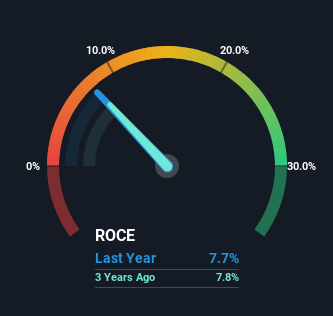There are a few key trends to look for if we want to identify the next multi-bagger. Ideally, a business will show two trends; firstly a growing return on capital employed (ROCE) and secondly, an increasing amount of capital employed. Basically this means that a company has profitable initiatives that it can continue to reinvest in, which is a trait of a compounding machine. In light of that, when we looked at Parkland (TSE:PKI) and its ROCE trend, we weren't exactly thrilled.
What Is Return On Capital Employed (ROCE)?
For those who don't know, ROCE is a measure of a company's yearly pre-tax profit (its return), relative to the capital employed in the business. To calculate this metric for Parkland, this is the formula:
Return on Capital Employed = Earnings Before Interest and Tax (EBIT) ÷ (Total Assets - Current Liabilities)
0.077 = CA$802m ÷ (CA$14b - CA$3.5b) (Based on the trailing twelve months to September 2024).
Thus, Parkland has an ROCE of 7.7%. In absolute terms, that's a low return but it's around the Oil and Gas industry average of 9.4%.
View our latest analysis for Parkland

Above you can see how the current ROCE for Parkland compares to its prior returns on capital, but there's only so much you can tell from the past. If you'd like, you can check out the forecasts from the analysts covering Parkland for free.
What Does the ROCE Trend For Parkland Tell Us?
In terms of Parkland's historical ROCE movements, the trend isn't fantastic. Around five years ago the returns on capital were 11%, but since then they've fallen to 7.7%. And considering revenue has dropped while employing more capital, we'd be cautious. If this were to continue, you might be looking at a company that is trying to reinvest for growth but is actually losing market share since sales haven't increased.
The Bottom Line On Parkland's ROCE
In summary, we're somewhat concerned by Parkland's diminishing returns on increasing amounts of capital. Long term shareholders who've owned the stock over the last five years have experienced a 18% depreciation in their investment, so it appears the market might not like these trends either. Unless there is a shift to a more positive trajectory in these metrics, we would look elsewhere.
If you'd like to know more about Parkland, we've spotted 4 warning signs, and 1 of them is significant.
While Parkland isn't earning the highest return, check out this free list of companies that are earning high returns on equity with solid balance sheets.
New: Manage All Your Stock Portfolios in One Place
We've created the ultimate portfolio companion for stock investors, and it's free.
• Connect an unlimited number of Portfolios and see your total in one currency
• Be alerted to new Warning Signs or Risks via email or mobile
• Track the Fair Value of your stocks
Have feedback on this article? Concerned about the content? Get in touch with us directly. Alternatively, email editorial-team (at) simplywallst.com.
This article by Simply Wall St is general in nature. We provide commentary based on historical data and analyst forecasts only using an unbiased methodology and our articles are not intended to be financial advice. It does not constitute a recommendation to buy or sell any stock, and does not take account of your objectives, or your financial situation. We aim to bring you long-term focused analysis driven by fundamental data. Note that our analysis may not factor in the latest price-sensitive company announcements or qualitative material. Simply Wall St has no position in any stocks mentioned.
About TSX:PKI
Parkland
Operates food and convenience stores in Canada, the United States, and internationally.
Solid track record established dividend payer.
Similar Companies
Market Insights
Community Narratives




